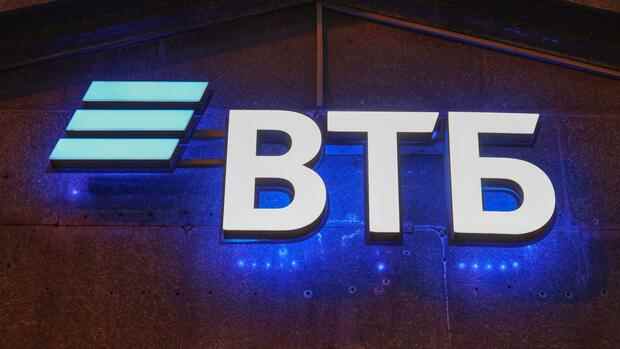The EU has excluded a total of seven banks from the Swift global payment system.
(Photo: Bloomberg)
Brussels, Frankfurt The EU officially issued the announced Swift sanctions against seven Russian banks on Wednesday. After a period of ten days, the private Belgian company Swift must exclude these banks from its news platform, which is used to report transactions between banks worldwide.
Swift is considered the backbone of global payments, and excluding a country from this system is one of the harshest financial sanctions. However, the EU’s package of measures has significant gaps.
Affected by the Swift exclusion are Otkritie, Novikombank, Promsvyazbank, Bank Rossiya, Sovcombank, VEB and VTB. With the largest Russian money house Sberbank and the Gazprombank two of the most important banks in the country are not on the list.
Commission circles confirm that the two banks were exempted in order not to jeopardize the energy business, which is so important for the West. While many trading relationships are currently being broken off, European customers are buying particularly large quantities of natural gas.
Top jobs of the day
Find the best jobs now and
be notified by email.
Other banks are also allowed to process transactions via Swift. One of the commission officials said that the main aim was to meet those institutes that are involved in equipping or financing the war in Ukraine. The sanctions are still not about hitting the general public, he emphasized.
More on the consequences of the financial sanctions:
Financial transactions with the sanctioned banks are not impossible, but costly. The EU Commission expects that smaller payments will be stopped. Larger amounts could theoretically be transferred further, but that would be much more complicated than before. Bypassing the Swift system with e-mail or fax is error-prone, commission circles give to consider.
The EU now wants to monitor whether and how the sanctions are being circumvented and react to them if necessary. The possibility of switching to cryptocurrencies is also being considered. There is an alternative system to Swift for banking transactions within Russia, but until recently only 30 percent of banks were connected to it.
For international business, banks could switch to a Chinese system. But that won’t work in the short term, according to Brussels. In addition, the Chinese system is not connected to Swift, so it would only allow transactions with a few banks.
Alongside the Swift ban, the EU has also banned banknotes from being physically brought across the border into Russia. Some banks have tried that, as the EU Commission observed. Now this practice is officially forbidden.
The researchers at the Leibniz Institute for Financial Market Research SAFE believe that the EU sanctions package can still be expanded. In addition to the measures taken so far, there could be a freeze on correspondent banking relationships with Russian banks, including the Central Bank of Russia, and a freeze on real economy imports and exports based on financial transactions. The EU has already decided to freeze the central bank’s foreign assets – according to experts, the toughest financial sanction against Russia to date.
More: Western sanctions are tough – but they won’t throw Putin off course just yet
